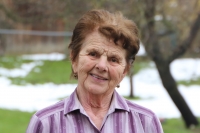Children, there is a war, you need to hide
Download image
Bohumila Špůrková, née Vágnerová, was born in December 10th 1936 in Olomouc. Until 1938, she lived with her parents in Žerotín Chateau in Nový Jičín, where her father František Vágner worked as a coachman of the nobility. After the Munich Agreement and following occupation of Sudetenland, the family had to leave the chateau and start to live in gamekeeper’s lodges in Nový Jičín District. First, they lived in Veřovice in 1938-1943, then in Mořkov. During the war, her parents helped the partisans. Bohumila Špůrková remembers the bombing, the liberation and post-war celebrations in Mořkov. After finishing the elementary school in Hodslavice in 1952 she started to work in Czechoslovak State Railways where she worked until she retired (1991). In 1953 her family lost their savings on fixed deposits due to the monetary reform. The witness got married to Josef Špůrek in 1958 and one year later they moved to Zašová, where she still lived during the recording of this interview (2021).
